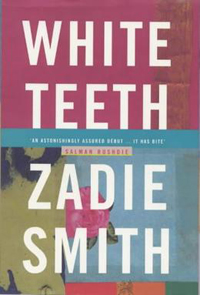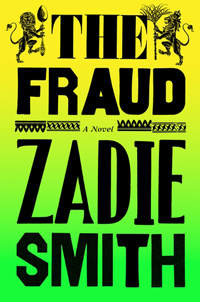 Zadie Smith’s first novel, White Teeth, crops up a number of times on the Post Colonial Literature pages on this site and is the genesis for an essay on how Post Colonial Literature rewrites traditional history. White Teeth was a much lauded, eccentric and energetic debut in 2000, its setting at the turn of the millennium a key component.
Zadie Smith’s first novel, White Teeth, crops up a number of times on the Post Colonial Literature pages on this site and is the genesis for an essay on how Post Colonial Literature rewrites traditional history. White Teeth was a much lauded, eccentric and energetic debut in 2000, its setting at the turn of the millennium a key component.
Smith has published a number of novels since and had a lengthy stay in the United States of America, but now she has returned to London and has published her latest novel, The Fraud. Smith has claimed that she now finds White Teeth nauseating, but its playful craziness is part of its charm – although within the style of realism, it’s not realistic. In a criticism, James Wood referred to it as ‘hysterical realism’. The intervening novels have played around with different forms, particularly the modernist NW (the title refers to a postal code district of London, where Smith was brought up), which makes the choice of a historical novel with The Fraud an interesting one.
 Smith’s journey through different styles in some ways mirrors her own considerations of the purpose and role of fiction itself, which she has explored in a number of essays and articles. With The Fraud she seems to be turning to George Eliot and in some ways emulating her great 19th century novel Middlemarch, to which references are made in Smith ‘s novel. As different stories are under construction in The Fraud, it is clearly as much about the creation of stories, or novels, as it is about the historical court case on which it is based, or about slavery, the key historical context.
Smith’s journey through different styles in some ways mirrors her own considerations of the purpose and role of fiction itself, which she has explored in a number of essays and articles. With The Fraud she seems to be turning to George Eliot and in some ways emulating her great 19th century novel Middlemarch, to which references are made in Smith ‘s novel. As different stories are under construction in The Fraud, it is clearly as much about the creation of stories, or novels, as it is about the historical court case on which it is based, or about slavery, the key historical context.
There have been some wildly different responses to the novel. The Guardian celebrates Smith’s return to the UK in this interview-based piece, while the review describes the novel as ‘flawless’. Not everyone is as complimentary. The New Statesman notes Smith’s previous reluctance to write a historical novel, and isn’t very impressed with the results. There is also a really interesting review in Vulture, which not only tackles The Fraud, but in doing so also considers the role of fiction, with a wide range of references inspired by Smith’s own statements and writings. This is definitely worth reading.
Mantel’s Final Word
In other news, a final book of Hilary Mantel is about to be published. Not a novel this time, but a collection of her non-fiction musings and memoirs. It’s described by her publisher as ‘provocative, intimate and often hilarious’. Look out for A Memoir of My Former Self: A Life in Writing.